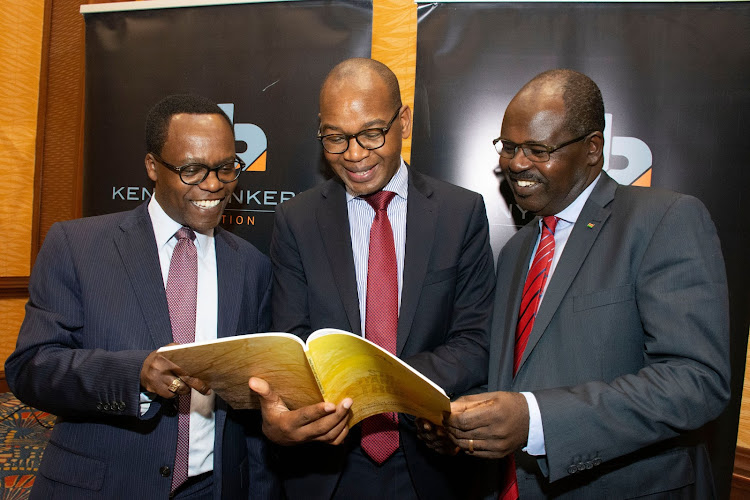KBA Chairman John Gachora, former chairman and KCB Group MD Joshua Oigara and CEO Habil Olaka during the KBA Annual General Meeting The banking sector in Kenya is recovering from the Covid-19 hangover strongly, with the rate of borrowers defaulting on loans dropping.
According to the Central Bank of Kenya (CBK), the sector reported strong liquidity and capital adequacy ratios last year, with almost every commercial lender reporting growth in earnings quarter to quarter.
The ratio of gross non-performing loans (NPLs) to gross loans stood at 13.1 per cent in December 2021, compared to 13.6 per cent in October.
”Repayments and recoveries were noted in the manufacturing, personal and household, transport and communication and building and construction sectors,” CBK Governor Patrick Njoroge said yesterday.
The banking sector registered a strong performance in the year ended December 31, 2021, with the asset base increasing by 11.1 per cent from Sh5.4 trillion at end of 2020 to Sh6 trillion.
The performance was underpinned by banks reviewing their business models leveraging on technology and innovation, enhanced capital and liquidity buffers and a continued focus on customer-centricity.
Growth in private sector credit increased to 8.6 per cent in December 2021, from 7.8 per cent in October.
Strong credit growth was observed in the following sectors: transport and communication (14.3 per cent), manufacturing (13.1 per cent), trade (8.5 per cent), consumer durables (15.0 per cent), and business services (9.5 per cent).
The number of loan applications remained strong in December, reflecting improved demand with increased economic activities.
Although banks are expected to post impressive results for the year ended December 31, analysts fear that the upcoming general election will impend the growth going forward.
According to the latest outlook by Renaissance Capital, there is a likelihood of a slowdown in economic activity in the year to June 30, with muted lending activity in the first half of the year.This, as lenders, adopts a wait-and-see approach in the run-up to the August 9 general election.Apart from the political risk, Renaissance Capital is worried that the cost of living is likely to go up on currency depreciation and high fuel prices.
